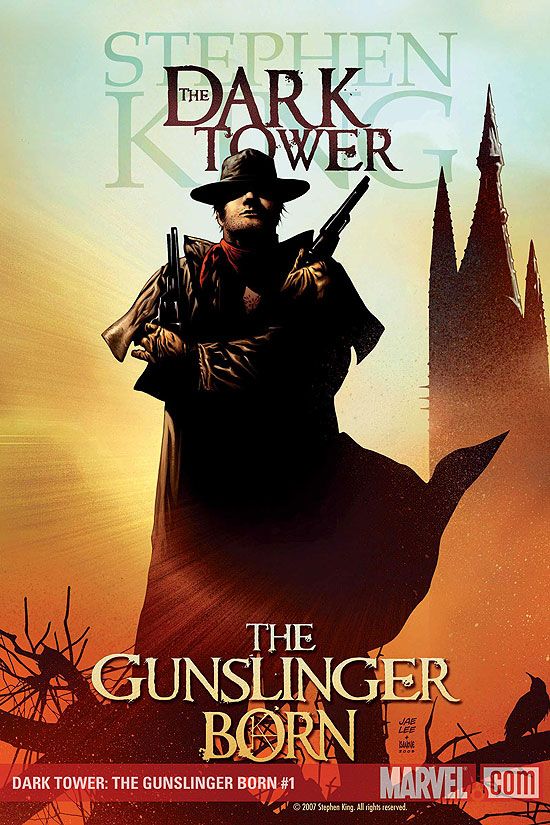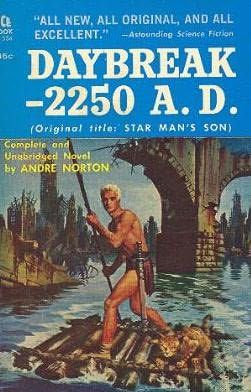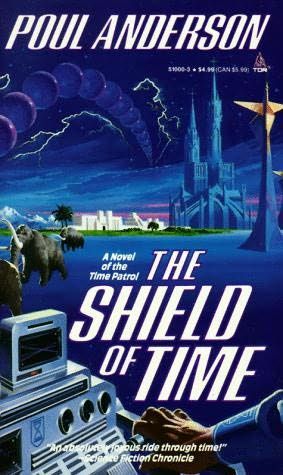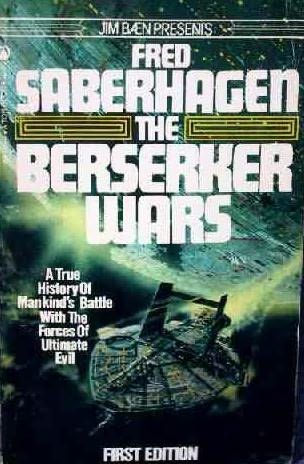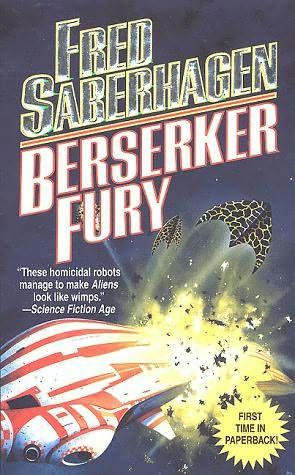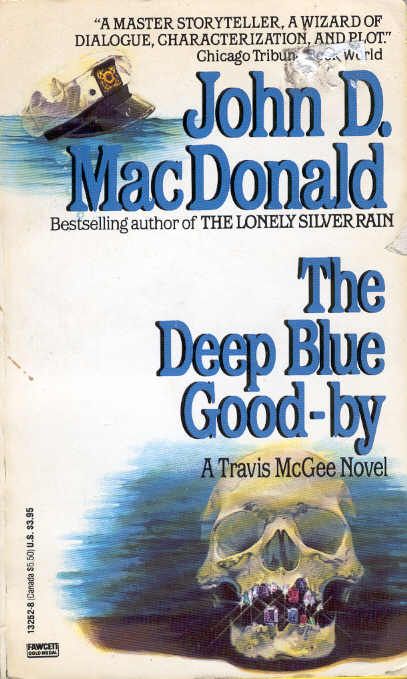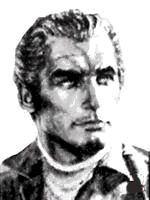Okay, so here's another parlor game for you.
I did a column a while back jumping off the idea of canceled TV shows that would make interesting original comics series, a la Dark Horse's Buffy Season 8.
But there's other places to find new ideas for successful comics. Marvel had such a hit with Stephen King's Dark Tower that they've announced that they're embarking on a version of King's The Stand, as well.
Now, I quite liked the first Dark Tower collection. I thought it was one of the best adapted works I'd seen in quite a while, and readers of this column know that I take an interest in the challenges of adaptation.
So that started me speculating. What are some other book series premises or characters -- prose books, you know, the kind with no pictures -- that might make for some fun and interesting original comics?
You have to figure the criteria should be pretty much the same. We're looking for:
1. A relatively open-ended premise. Something that can generate a lot of different kinds of stories. We needn't be rigid about the dictionary definition of "open-ended" -- after all, World War II only lasted six years and change and we all know how it ended, so it's technically rather finite. But it's still generated thousands of stories and series. So when I say open-ended that's what I mean -- a way to tell more than ONE story.
2. Visually interesting. Nero Wolfe made for a terrific series of mystery novels and a pretty good TV show on A & E; but as a comic book I don't think there's enough actual movement. Rex Stout's books were all about the humorous setup and the breezy dialogue. On a TV series with talented actors having fun, that can work. But as a comic I think it would be way too static. (Although there WAS a Wolfe comic strip decades ago, briefly, ghosted by Green Lantern scribe John Broome.) But for our purposes let's try to think of a series with lots of cool stuff an artist can draw.
3. Something that doesn't suffer from Gilligan Syndrome. Meaning something with a flaw in its premise, a series that is set up so that if the protagonists solve their basic problem, the series is over. Gilligan and friends get off the island, we're done. Richard Kimble catches the one-armed man, we're done. Captain Janeway gets the crew of the Voyager home, we're done. (Yes, I know my examples are all from successful TV shows that ran for years. I don't care. It's still a flaw. Let's avoid it.)
4. Largely plot-driven. Stuff has to happen. This is part of that "visual interest" requirement, really -- your artist needs stuff to draw besides talking heads. This doesn't necessarily entail wall-to-wall fight scenes or anything; it just means your protagonist should somehow be in motion. Doing different things. Ideally, doing them in a variety of different places as well. Stories with visual variety will help your artist's work.
I'd say those qualifications are required. I'm going to add a couple more just for me -- I'm limiting myself primarily to dramatic (as opposed to comedic) premise possibilities, because that's what I like and because most of our readers here tend to be Marvel and DC types. The Giffen-era Justice League is about as funny as we like our funnybooks to get, judging from sales.
So, factoring that in as well, I'm going to try to keep it to things that would probably work for a superhero kind of audience -- swashbuckling, adventure kinds of things.
Okay? So, those being the ground rules, my first thought was, Geez, they want more King? Why not Firestarter?
It's practically a superhero comic as it stands. The story: a girl named Charlie McGee is a mutant, the offspring of two young people who were experimented on by a sinister governement agency called the Shop. Charlie and her father are on the run after her mother has been murdered by Shop agents. Charlie's chief pursuer is a creepy, obsessed assassin named John Rainbird.
Oh, and Charlie can start fires with her mind. Big, scary fires that can vaporize concrete if she wants them to.
It was a fun book and ended on a note that would really lend itself to further adventures. There was a movie with Drew Barrymore (that admittedly got almost universally bad reviews, though I rather liked it, myself.) There was also a made-for-TV sequel, Firestarter Rekindled, that picked up the story with Charlie as a teenager and both her parents gone.... but Rainbird and the Shop are still on the trail, and they've brought other mutants with them.
None of this was anywhere near High Art, but it was fun. As a series it certainly seemed do-able. So there would be definite possibilities there.
The downside is, well, we've already seen all kinds of mutants on the run in comics. There's not a lot that would be new and different there. Hell, half the readership would jeer that it was ripping off NBC's Heroes. (Speaking of Heroes, I wonder if someone over on the Wold Newton site is speculating that Jessalyn Gilsig's character -- Claire the cheerleader's pyrokinetic mother -- is actually a grown-up Charlie McGee, and that the organization Linderman founded with Hiro's dad and the others was once known as the Shop... oh my GAWD I'm such a nerd sometimes I scare myself.)
Anyway, as a comics ongoing, I think Firestarter might be interesting. Though I suspect the upcoming comic version of The Stand might well be the better story, my hunch is that book is basically one story, not a series premise. Once your triumphant little band of apocalypse survivors has faced down the demonic Flagg, what else is there? How many different stories can you spin out of that? As a premise Firestarter has more places to go.
Speaking of post-apocalypse fiction, Andre Norton's book Star Man's Son (or Daybreak 2250 A.D., depending on how old you are) is a natural for a comics sequel.
Here's a synopsis I stole off a fan site. See if you don't agree with me:
After a terrible nuclear war, Earth is a devastated ruin. Only a few humans survived and many of these were also mutated into Beast Things and other horrible creatures in the "blue cities" where radioactivity lingered. A very few survivors, however, received beneficial mutations that improved their chances of survival, but the seemingly normal survivors feared and hated any and every mutant.
Fors is the son of Langdon, a Star Man, a far-ranging explorer and leader of the Eyrie, and a woman that Langdon had met down on the plains. Although Langdon was seemingly normal, Fors has inherited white hair from his mother, a mutation viewed with suspicion by the other residents of the Eyrie. While Langdon was alive, he protected Fors from most of the fear and hatred, but then Langdon was killed by Beast Things on an exploration into a far city and the men who find him bring back only a few of his belongings.
After that, Fors was mostly ignored in his efforts to become a Star Man like his father. He has been adopted by Lura, a great hunting cat, and has made his own sword, knives, bow, and arrows as required. His father, a master teacher among the Star Men, had already ensured before his death that Fors knows all that is required. Nevertheless, the Council has passed him over for five years and tomorrow he will have to give up his weapons and become a tiller of the soil. As he ponders his options, Fors conceives a bold plan and immediately starts gathering supplies and equipment, including his father's pouch, for a great journey to search for the lost city in the north that was never bombed and thus is safe for scavengers.
Although Fors has tried to hide them, he has some unusual talents that will help him on his trek: he is able to communicate empathically with Lura and he has much better night vision that most humans. Moreover, he has other, more subtle talents that manifest as he travels.
Fors eventually succeeds in his quest to become a Star Man, and with his friend Arskane of the Plains you have a great partnership set up for future adventures. Reclaiming a ruined Earth has been a standby for all kinds of SF series, from Planet of the Apes to Kamandi to The Road Warrior.
Of course there's probably a good comic-book series to be made from Norton's Beastmaster, as well. But Dar's already had movies and a reasonably successful syndicated TV show and I like the idea of the Star Men better. Someone should give young Fors a shot in comics.
Another SF classic that seems like a natural comic-book series to me is Poul Anderson's Time Patrol.
The adventures of Manse Everard and his colleagues in the Time Patrol as they try to keep history on its proper path are, again, based on a premise that's not new to comics -- but Anderson's Time Patrol tales have the advantage of Anderson's meticulous research and understanding of sociology. It's Timecop with class.
You could just adapt the books as they stand and get a couple of years' worth of comics; but if you treated the series the same way as Marvel and Dark Horse did Conan, using their method of weaving the authentic adaptations in and out of original stories in an ongoing monthly, you'd have something that ran for a decade or two.
Another science-fiction premise that seems like an obvious monthly-comic-book possibility is Fred Saberhagen's Berserker books.
This is an amazingly cool series about a doomsday weapon left over from an ancient interstellar war that humanity must contend with, an army of self-replicating robots that have only one directive -- wipe out all organic life.
It's the Terminator's Skynet, but on a galactic scale. Over the course of dozens of novels and short stories, Saberhagen was able to ring endless variations on the theme of flawed-and-human versus merciless-and-mechanical... with humanity's flaws very often proving to be the factor that gives them the win. There's a rumor that someone was actually going to try this as a comics series but I don't think it happened. It's a shame, because I think it would be a terrific idea, especially with a semi-anthology approach like Warren Ellis took with Global Frequency.
But there's lots of possibilities outside of the SF/fantasy arena, too. The mystery and detective genre is full of continuing series characters. Sherlock Holmes has been done a number of times in comics, as well as Mike Hammer and Modesty Blaise.
But it's possible to go a little further off the reservation than that. There've already been plenty of comics about spies and tough guys in trenchcoats. The detective/thriller genre has lots of series possibilities beyond those.
A speculation that has occasionally occurred to me over the years is the idea of doing John D. MacDonald's Travis McGee as a comic.
It's a really flexible premise. MacDonald designed it from the beginning as a series, one that was targeted directly at the mid-20's single guys that were reading paperback-original action stories at the time. (Does that demographic sound familiar?)
Travis McGee lives in Florida, aboard a houseboat he won in a poker game. To the casual observer, he's a cynical loafer who lives off the occasional odd job, a boat bum who likes to tell people he's taking his retirement in installments in between gigs while he's young enough to enjoy it. But Travis actually makes his living, not as a private detective, but as a self-styled "salvage expert," a court of last resort.
If someone has taken something from you, and there's no way conventional law enforcement will ever get it back, Travis McGee will retrieve it for you; and when he gets it back, he keeps half.
That simple premise has taken Travis all over the U.S. and Mexico, it's taken him after sunken treasure and through Mayan ruins, and it always puts him -- and usually his girl of the moment -- in harm's way. There's something very comic-booky about the series, at least I've always thought so. Travis often functions as a vigilante, taking out sociopathic killers the police can't touch. He maintains a secret identity of sorts. He trains with the obsession of Bruce Wayne, and in addition to his athletic prowess he is a gifted actor and mimic as well as a fearsomely intelligent observer of the human condition. And when he gets his moral dander up, he is no less an avenging crusader than any of his masked four-color brethren.
Travis has never done well outside of the twenty-one original novels by MacDonald, though. There was a movie in the 1960's, Darker Than Amber, that purported to adapt the seventh book but managed to throw away most everything that made it a good story.
Directed by a pre-Enter The Dragon Robert Clouse, it's notable primarily for a climactic fight scene so brutal that the print for U.S. release had to censor it. There was another made-for-TV movie done in the 80's adapting The Empty Copper Sea, with Sam Elliott as McGee, that was quite a bit better. Both films were intended to be first in a series, though, and it didn't happen.
I still think McGee would work great in a comic book, though, and the main reason is because Denny O'Neil and Denys Cowan practically did it already.
When you read the O'Neil/Cowan Question anyone familiar with Travis McGee will catch the similarities. The way Cowan drew him, Vic Sage even looks the way McGee used to on the old Signet paperback editions.
That's not to say there was any plagiarism going on. It's more like a resonance, an echo. Denny O'Neil was a fan of MacDonald and though I don't for a moment think one was derived from the other, I do sense a certain influence, especially in the way Sage's pal Rodor became analogous to McGee's friend and confidant Meyer.
So, since we've already had a comic that came close, why not really do it? It's kind of like my feeling about the Punisher vs. Mack Bolan -- there's something annoying about having to settle for the ersatz superhero version when someone can just as easily do the real one. (Well, okay, Marvel couldn't really use the actual Mack Bolan in Spider-Man, but you see what I mean.) I could see McGee working as the same kind of tough-as-nails monthly comic as Criminal, something along those lines. Get someone like Alex Maleev to draw it.
Anyway, that's just the tip of the iceberg. I came up with about a dozen more possibles -- Dorothy Gilman's Mrs. Pollifax, Lee Child's Jack Reacher, Kim Newman's Diogenes Club, many others. Feel free to suggest your own.
I warn you, though, playing this game is hard to stop once you start.
See you next week.


